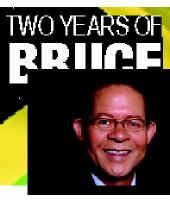Columns By Category
Popular Articles
- THE REALITY OF TACKY AND SAM SHARPE
- PLEASE DON’T BETRAY US AGAIN POLITICIANS
- CRY, MY MURDEROUS COUNTRY
- MODERNIZING THE PNP: VERSION.2020
- IS THE EXCHANGE RATE ON TARGET OR IS IT A WHOPPER?
- CARICOM: BEACON OF DEMOCRACY OR COWARDLY DISGRACE?
- DEMOCRACY PREVAILS IN THE UNITED STATES
- THE CRIME STATISTICS SPEAK FOR THEMSELVES
- PETROJAM, OIL PRICES, AND THE $7 TAX
- Kevin O'Brien Chang | Brains, not brutality – smart(phone) crime fighting
- TERRORISM IN JAMAICA
- STOP CURRENCY CRISIS TALK
- 'CASTIGATED KD' AND THE 9 YEAR WONDER
- GET PAST MERE TALK ON DONS AND GARRISONS
- LOW VOTER TURNOUT MYTHS AND ELECTION PREDICTIONS
- HOW GREAT CAN BROGAD BE?
- PNP WAS SOCIALIST FROM THE START
- AN AGE AND GENDER RE-ALIGNMENT ELECTION?
- Most influential Jamaican of 2010-2019?
- NO GAYLE, NO RUSSELL, NO TALLAWAHS
A Fighting Knock on a Sticky Wicket
- 8-30-2009
- Categorized in: 2009 Articles, Politics
http://jamaica-gleaner.com/gleaner/20090830/focus/focus1.html
Published: Sunday | August 30, 2009

Kevin O’Brien Chang
IF JAMAICAN politics was a cricket match, the state of play report might read something like this.
"Put into bat on a sticky wicket, the Jamaica Labour Party (JLP) Government reached 220 for six, thanks mainly to an unbeaten captain's knock of 85 from Bruce Golding. With the ball swinging and spinning on a pitch of uneven bounce, the JLP lost the early wickets of Derrick Smith, Trevor MacMillan and Clive Mullings.
"But with decent support from Ed Bartlett, and a good half century by Andrew Holness, skipper Golding shepherded his side to a reasonable total, which may be larger than it seems on a tricky track. The JLP was aided immensely by the PNP's amateur field setting and proliferation of wides and no balls. Yet, with the fragile Labourite batting line up so over-dependent on its leader, the match remains very much in the balance."
always relative
Politics, like life, is always relative. The question of 'How is this Government doing?' really means 'Would the Opposition have performed better or worse in the same circumstances?' In its first two years in office, this JLP Government has done some good things, while committing its fair share of blunders. My gut instinct rating is a so-so B minus to B, while a very politically observant friend scores the Cabinet thus. (See report card).
On the other hand, the Portia Simpson Miller-led Opposition is right now contributing almost nothing constructive to the national political debate, and could deserve no more than a C-. From its nonsensical legal efforts to prevent the Public Service Commission membership from being changed, to its naked power grab attempts to get the 'dual-citizenship seats' awarded to it in court, the People's National Party (PNP) has been a study in irrelevant ineffectuality. Recently, we saw the absurd spectacle of the PNP Youth Arm attempting to run its own candidate in North West Clarendon by-election before being slapped down by higher ups. Until the party implements the recommendations of the Meeks Report it commissioned last year, the current PNP leadership will remain discredited.
The positive JLP accomplishments are headed by free health care and education. Whatever the implementation hiccups, at least these promises were kept. There has also been a marked increase in the number of police charged for corruption and misbehaviour, giving some hope that the force is slowly being purged of bad eggs. My politically savvy friend also lauds Joan Gordon-Webley and the National Solid Waste Management Authority (NSWMA) for their work in trying to clean up the country. He says his parents, now in their late 60s, had until recently never seen a garbage truck in their Manchester district. Now garbage is being collected there once a week.
However, the behaviour of some ministers and public body appointees makes the public wonder if this administration is any more committed than its predecessor to stamping out corruption. The unfortunate Douglas Chambers (the late chairman of the Jamaica Urban Transit Company) affair left numerous still-unanswered questions. And many eyebrows have been raised over the $60 million upgrade of Transport and Works Minister Mike Henry's official residence.

Digitally altered photograph of PM Bruce Golding by Raymond Simpson.
The JLP also appears no more serious about tackling the root causes of crime than the PNP was. JLP leader Bruce Golding has been as silent about garrisons as National Democratic Movement leader Bruce Golding was vocal about the need to dismember them. As to the issue of fatherlessness that criminologists everywhere agree is a main driver of crime, well, there has been some talk but no known action yet.
According to the May 22 Gleaner, Prime Minster Golding told Parliament "Cabinet has given drafting instructions ... to require the inclusion of the father's name in the registration of birth," and "the legislation should be in Parliament in the next three months". Well, it's now August, and we have heard nothing since.
The JLP came to power just as the worst financial crisis since 1930 was flattening the world economy. We entered the downturn with a net-government deficit of around 113 per cent, one of the highest on the planet. Since this would have been unsustainable even in a booming global economy, it's hardly surprising that Forbes magazine ranked Jamaica as the one of the world's 10 hardest-hit economies. (http://www.forbes.com/2009/07/08/economics-iceland-ireland-business-beltway-countries.html).
For all the hue and cry about the return to the International Monetary Fund (IMF), no one has suggested any credible alternative. With tourism down, remittances shrinking rapidly and bauxite having collapsed, there is now a multi-billion dollar hole in the budget. The Government basically has three choices: a) default on some of our loans, and ruin our credit rating for a generation; b) fire a quarter of government workers, and risk mass riots; c) borrow enough to, at least, temporarily plug the fiscal gap, cut a little here and there, and pray for a quick global turnaround. And who else but the IMF is going to lend a country with a net-government deficit of 113 per cent any more money?
The Opposition's response to these realities, particularly that of former finance minister, Omar Davies, has been disappointing, and even irresponsible. Considering that in his 14 years of stewardship Jamaica's annual GDP growth rate never reached even 3 per cent, nor ranked higher than 124th in the world, Dr Davies should be the last man to accuse anyone of incompetence.
It is very instructive to compare Jamaica's economic record since 1994 with that of our West Indian cousin, Barbados. Faced with mounting economic problems in 1993, then Bajan Prime Minister Erskine Sandiford imposed stiff austerity measures and was promptly voted out. But this 'short-term pain for long-term gain' approach paid off for his country, with its economy having grown cumulatively by almost 50 per cent since then.
Having observed Sandiford's fate, our Government took a very different approach. Rather than confronting the people with their own profligacy, it kept borrowing to maintain the status quo. The end result has been one of the world's highest net government debt ratios, and cumulative net growth less than one-third that of Barbados. On the other hand, former prime minister P.J. Patterson never lost a general election.
So where do we go from here? Well, whatever the mouth talk, even hard-core Comrades are probably glad deep down that it's Bruce Golding who is at the helm of the good ship, Jamdown, as we try to navigate the roughest economic seas since the 1930s Great Depression. It's a little unnerving to feel that the country is so seemingly dependent on one person, who is, after all, just a man. But no one else has displayed anything like Golding's command of the issues at hand.
Hopefully, in a year or two we can get back to the usual 'kass-kass' this country so loves. But right now economic survival is the name of the game for Jamaica. And if the hardest working, most articulate, and probably smartest, politician in the land can't bring us home safely to port, who can?
Report card for Bruce Golding's administration
Prime Minister Bruce Golding - A
Foreign Affairs - Ken Baugh - C
Justice Dorothy Lightbourne - C-
Finance Audley Shaw - B-
National Security Dwight Nelson - C-
Education Andrew Holness - A
Industry Karl Samuda - B
Tourism Ed Bartlett - A-
Agriculture Chris Tufton - B
Mining & Energy James Robertson - B-
Water & Housing Horace Chang-C-
Labour Pearnel Charles - B-
Health Rudyard Spencer- B
Sport & Culture Olivia Grange B+
Transport Mike Henry - B
